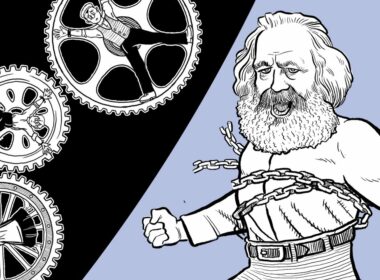In the November 2020 issue the article headed “From A to B, and everything in between” outlined the CPI’s transformative strategy. The present article is a short follow-up based on discussions that have come up since the article was published, which I hope will further illuminate the thinking and ideas […]
Political Economy
Marxism and the housing crisis
“Our cities can never be made really habitable or worthy of an enlightened people while the habitations of its citizens remain the property of private individuals. To permanently remedy the evils of city life the citizens must own their city.” (James Connolly, Workers’ Republic, 18 November 1899) “The so-called housing shortage, which […]
How long will they get away with it?
Two instructive headlines from the bourgeois financial news web site Business Insider give an indication of how the balance of global wealth has shifted since the covid-19 pandemic began in early 2020. The first: “Billionaires made $3.9 trillion during the pandemic,” informing us that the likes of the Victorian workhouse […]
Caomhnóir ina shabaitéir
An bhliain seo caite méadaíodh 74 faoin gcéad ar bhrabús an chomhlachta phríobháidigh otharcharr is mó sa tír, Lifeline Ambulance Service. Is le David Hall, a bhain cáil amach cheana mar fheachtasóir morgáiste, an comhlacht.
Time to stop pandering to the rich
On 11 December 2019 the EU Commission adopted the “European New Green Deal,” with the aim of continued growth coupled to a climate-neutral, fair and prosperous society by 2050. On 19 December the same year the Circular Economy Action Plan was passed by the Commission. Its aim is to replace […]
Who said that?
“Again, it is important to highlight here that what failed was the state’s management of public enterprises, not the capacity of society to manage its assets in a democratic manner. This is a country under a blockade and capitalists don’t pay taxes!”—Pedro Eusse, Political Bureau, Communist Party of Venezuela, commenting […]
Marx, Gamestop, and finance capitalism
As retail investors launched a short squeeze on large hedge funds, forcing large stock-market movements and frenzied recapitalisation, many commentators heralded it as a victory for “the little guy” against Wall Street. However, the truth is far from that simple. “The biggest owners of Gamestop: Fidelity (14%), Cohen’s RC Ventures […]
€38.04 an hour?
The upper limit of a transformative wage demand A transformative strategy is “a means by which to expose the antagonistic contradictions between capitalism and the working class and, in so doing, to undermine capitalism and present the potential for a socialist alternative.”¹ While an increase in the minimum wage from […]
The future of agriculture in Ireland
The news that Britain has applied to join the Comprehensive and Progressive Agreement for Trans-Pacific Partnership (CPTPP) is a big blow to Irish farmers and rural agri-business workers. The CPTPP is different from the EU, in that it has no customs union or single market. It is a free-trade organisation, […]
Consumer spending driving us to the brink of extinction
Consumerism and the military-industrial complex go hand in hand in generating massive profits for global corporations. The military-industrial complex is the guarantor of cheap raw materials and cheap labour so that we in the First World can gorge on a never-ending supply of consumer goods at prices that we could […]
Who said that?
“It’s a small nation with a strong identity, but it jumps like a puppy desperate for attention from one of the big boys—in this case, Biden. His PR team have played the Irish like a Stradivarius.”—Chris Sweeney, author and columnist, on Ireland’s “relationship” with Joe Biden “Ah, yes, America. The […]
Work, our mental health, and the disease of neoliberalism
Even our primate ancestors “worked”; they had “jobs”—not as we know them today but jobs nonetheless. And they “worked” to feed themselves and their offspring, just as we must do today. But of course they worked only to satisfy their needs: there was no working for someone, or being exploited.
Early human farming too was to survive; but then, with improving farming techniques, not only did…
Water is a human right
At the end of 2020 the water “futures” of California, the largest state in the United States in population and economy, were floated on Wall Street for the first time, under the banner of Nasdaq Veles California Water Index.1 It was the first flotation of its kind, offering potential investors the opportunity to hedge against the future availability of water in California: in simple terms, to get rich from the scarcity of the most important substance for all human, animal and plant life to survive.
Our health is in their hands—for profit
We might see this as amusing, or a bit futuristic. Wrong! It’s here already. Amazon Health, Amazon Pharmacy and Babylon Health, among many others, are testing new “digital medical systems,” where you ask a computer about your health. This, in time, will spell the end of GPs as we know them.
The same systems could be used for cancer consultations or any
Who said that?
“The significance of the public service to the overall wellbeing of the country has never been more evident than during the past 10 months.”—Michael McGrath, minister for public expenditure, 16 December 2020
China’s digital currency
In 2008 the inventor of Bitcoin, Satoshi Nakamoto, expressed his view that “the root problem with conventional currencies is all the trust that’s required to make it work. The central bank must be trusted not to debase the currency, but the history of fiat currencies is full of breaches of that trust.”¹ This is an old right-wing libertarian talking-point: “When the state spends money to achieve social aims, it devalues money in general, which is an attack on people with lots of money.”














